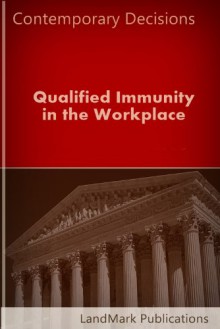This casebook contains a selection of 110 U. S. Court of Appeals decisions that analyze and discuss the qualified immunity defense when asserted by an employer in a suit brought by an employee. The selection of decisions spans from 2005 to the date of publication. For each circuit, the cases are...
show more
This casebook contains a selection of 110 U. S. Court of Appeals decisions that analyze and discuss the qualified immunity defense when asserted by an employer in a suit brought by an employee. The selection of decisions spans from 2005 to the date of publication. For each circuit, the cases are listed in the order of frequency of citation. The most cited decisions appear first.To determine whether a government official is entitled to qualified immunity, we ask two questions: whether the official violated a statutory or constitutional right, and whether that right was clearly established at the time of the challenged conduct. Ellins v. City of Sierra Madre, (9th Cir. 2013)The federal-law principles governing entitlement to qualified immunity with respect to alleged violations of the Constitution are well established. Qualified immunity protects public officials performing discretionary functions from personal liability in a civil suit for damages "insofar as their conduct does not violate clearly established statutory or constitutional rights of which a reasonable person would have known." Harlow, 457 U.S. at 818, 102 S.Ct. 2727. "[W]hether an official protected by qualified immunity may be held personally liable for an allegedly unlawful official action generally turns on the 'objective legal reasonableness' of the action, Harlow, 457 U.S., at 819, 102 S.Ct. 2727, assessed in light of the legal rules that were 'clearly established' at the time it was taken, (id., at 818, 102 S.Ct. 2727." Anderson v. Creighton, 483 U.S. 635, 639, 107 S.Ct. 3034, 97 L.Ed.2d 523 (1987). Lore v. City of Syracuse, 670 F. 3d 127 (2nd Cir. 2012)While "[t]he presumption is that qualified rather than absolute immunity is sufficient to protect government officials in the exercise of their duties," Burns v. Reed, 500 U.S. 478, 486-87 (1991), "there are some officials whose special functions require a full exemption from liability." Butz v. Economou, 438 U.S. 478, 508 (1978). Judges and prosecutors are entitled to absolute immunity when functioning in their official capacities. Knowlton v. Shaw, (1st Cir. 2013)
show less

